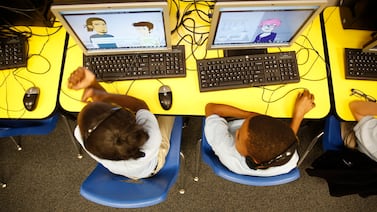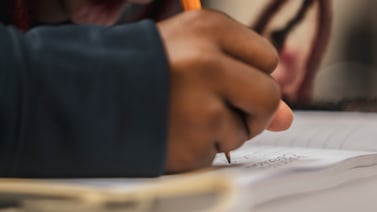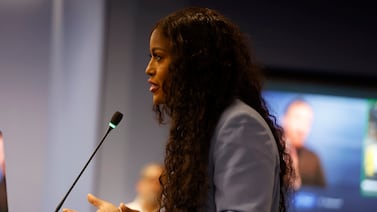Sign up for Chalkbeat Indiana’s free daily newsletter to keep up with Indianapolis Public Schools, Marion County’s township districts, and statewide education news.
Update: The Indiana legislative session ended on March 8, 2024. Here are the education bills that did and didn’t pass.
After several years of focusing on how teachers teach, Indiana lawmakers appear to have largely shifted their attention this year to concerns about students’ academic performance and behavior stemming from the pandemic’s disruptions.
Banning cell phones from classrooms, holding more kids back, and improving student discipline and absenteeism have all emerged as priorities for the 2024 legislative session, which began Monday, when Gov. Eric Holcomb also laid out his education policy agenda.
It’s a short session in an even-numbered year, meaning lawmakers have less time to consider bills, and no budget to put together. Legislative leaders have also said to expect a quieter session after several years of major curriculum changes affecting things like literacy, as well as divisive and high-profile bills about critical race theory and book bans.
But that doesn’t mean those types of cultural issues won’t get any attention.
On Monday, Sen. Jeff Raatz, the GOP chair of the Senate Education and Career Development Committee, along with Republican Sen. Gary Byrne introduced a bill to require local school boards to approve curriculum materials for sex education classes. They would also have to publicize certain information about those classes, such as what is taught and whether the lessons separate or integrate male and female students.
Here’s what to expect from policymakers this year that could mean big changes for students, families, and teachers.
A focus on reading and third grade retention
Holcomb and Republican lawmakers agree there’s a need to reinvigorate the state’s policy to hold back third graders who don’t pass the state reading test, known as the IREAD.
While retention has long been Indiana law, data from the state education department shows that a growing number of these students have moved on to fourth grade regardless of whether they have what’s known as a good cause exemption, like if they have special education or English language learner status.
Studies on retention have demonstrated mixed results, often showing positive academic effects but negative social-emotional effects. A recent study of Indiana data from the Annenberg Institute at Brown University found that retention did not affect attendance or student discipline.
A renewed focus on retention would be the next phase of the state’s ongoing efforts to improve literacy, which have included new laws enacted last year mandating instruction rooted in the science of reading.
“We want to make sure folks aren’t put at a disadvantage in grades 4, 5, 6 and on when they haven’t mastered that reading skill,” Holcomb said Monday.
But teachers, Democratic lawmakers, and education advocates have expressed skepticism over more retention. They say that policies that encourage personalized attention and intervention could better boost students’ reading performance.
“We can’t just hope that we can put 29 or 32 first graders in a classroom and believe the outcomes are going to be the same for schools that are able to staff at a class size of 18 to 20,” said Keith Gamble, president of the Indiana State Teachers Association, in a November press conference.
Additional early learning programs, including universal preschool, would improve literacy rates more than “holding kids back and bottleneck schools,” said House Minority Leader Phil GiaQuinta, a Fort Wayne Democrat, in his opening remarks on Monday.
Lawmakers had yet to file a bill focusing on retention as of Monday. Senate bills must be filed by 4 p.m. on Tuesday, while House bills must be filed by 2 p.m. on Thursday.
Holcomb also called for a new requirement for schools to administer the state reading test, the IREAD, in second grade — an option that the state department of education has offered since last year.
Almost 46,000 second graders in over 700 schools took the IREAD early, allowing their schools to offer targeted interventions in third grade for those who didn’t pass.
Holcomb’s agenda also included new summer reading programs for students who don’t pass the IREAD, as well as ongoing testing for students who don’t demonstrate reading proficiency after third grade.
The state department of education has previously said that there’s little data tracking whether students who don’t demonstrate reading skills by third grade ever catch up.
Senate Bill 6, which Raatz also introduced Monday, would charge the department with developing a method to identify older students who don’t have reading skills.
Laws on attendance, cell phones, antisemitism expected
Legislative leaders have also suggested that they’ll crack down on absenteeism, which has spiked nationwide, as well as consider a ban on cell phones in schools.
While those key pieces of legislation have yet to be released, several bills have already been filed that offer a look into what lawmakers may discuss, including one to require armed intruder drills in schools.
The House Education Committee will meet for the first time on Wednesday at 10:30 a.m., with three bills on the agenda:
- House Bill 1001 aims to make changes to last year’s legislation on career scholarship accounts, including allowing students to use their scholarship funding to obtain drivers’ licenses. It would also allow students to use funds earmarked for college courses for job training.
- House Bill 1002, a repeat bill, aims to codify the state’s policy against antisemitism and discrimination on the basis of religion at educational institutions.
- House Bill 1042 would allow the state to use any remaining balance in the next generation Hoosier educators scholarship fund for additional funding for transition to teaching scholarships.
The Senate education committee had yet to schedule a meeting as of Monday.
Meanwhile, the teachers union has called on lawmakers to help fix growing student discipline issues by creating a pilot program on social-emotional learning, as well as a statewide commission to improve student discipline, including absenteeism.
The union also wants to see increased education funding — a tough sell to lawmakers during a non-budget year — in order to boost wages for education support professionals and reimbursements to schools for textbooks that were made available to families for free last year.
More early learning and higher education options
Outside groups like the Indiana Chamber of Commerce have again called for lawmakers to focus on early learning and child care as a critical component of workforce development.
But while the Republican-controlled legislature has taken incremental steps to expand access to child care in recent years, they remain reluctant to commit to sweeping changes like a universal preschool program championed by Democratic lawmakers.
Holcomb called for several deregulatory initiatives likely to gain traction with lawmakers, including lowering the minimum age for infant and toddler caregivers from 21 to 18, and making it easier for K-12 teachers to also work as substitutes in early education.
In higher education, Holcomb outlined several potential initiatives that would allow students who have some credit hours — even those who have left school — to earn associate degrees. Another would require state universities to consider creating three-year degree programs.
One bill already filed by GOP Sen. Blake Doriot would require state educational institutions to publish information about job placement and average wages for different degree programs.
The House and Senate will meet again Tuesday afternoon, with committee hearings throughout the week.
Aleksandra Appleton covers Indiana education policy and writes about K-12 schools across the state. Contact her at aappleton@chalkbeat.org.







